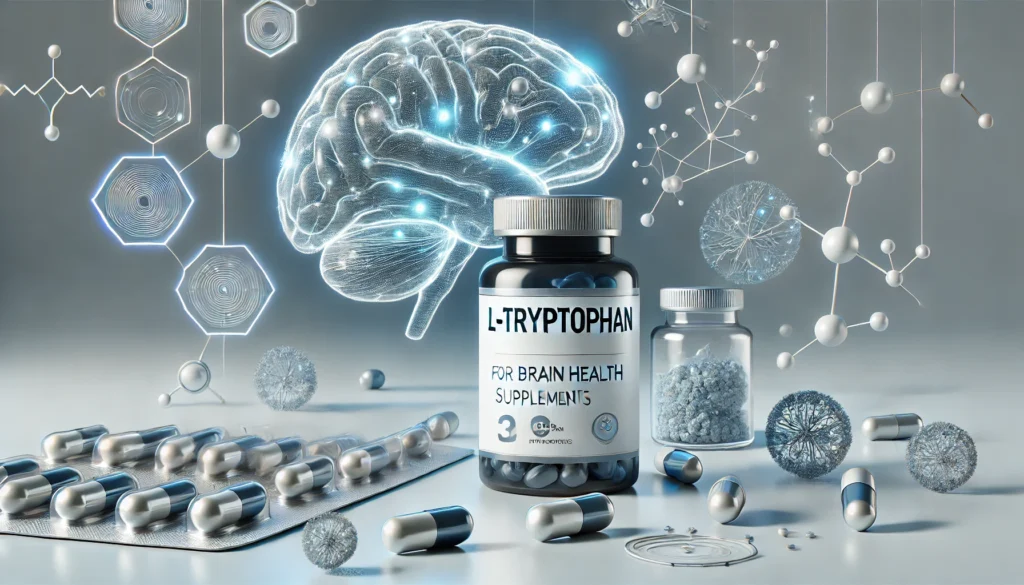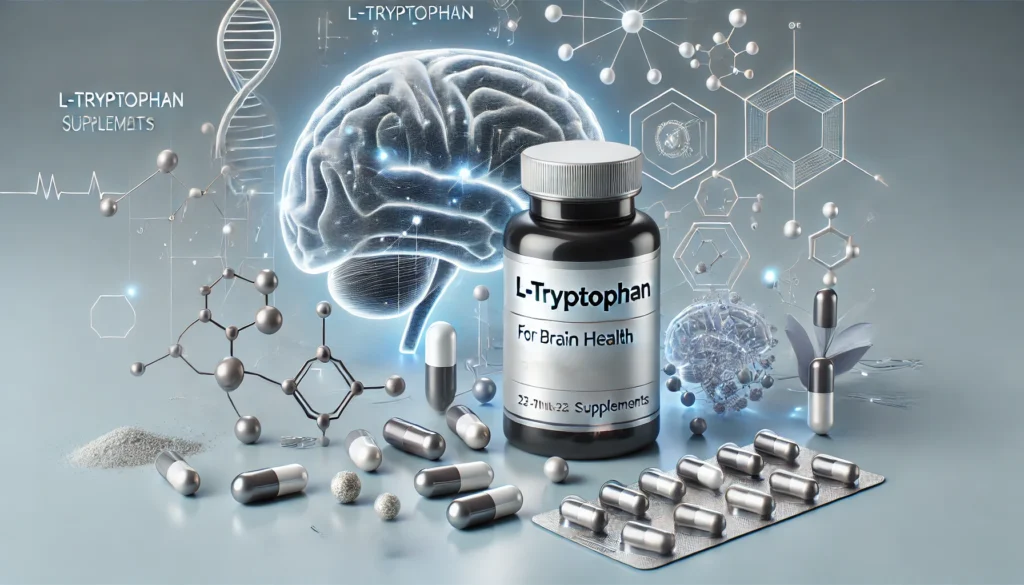L-tryptophan is an essential amino acid with a critical role in various physiological processes, including protein synthesis, serotonin production, and melatonin regulation. Found in both dietary sources and supplements, L-tryptophan is widely recognized for its impact on mood, sleep, and cognitive health. As research into nootropics advances, L-tryptophan has gained attention for its potential to enhance cognitive function by influencing neurotransmitter pathways in the brain.
This article provides a detailed exploration of L-tryptophan, focusing on its sources, chemistry, physiological mechanisms, potential nootropic benefits, dosing guidelines, side effects, drug interactions, and considerations for safe supplementation. Whether you’re exploring its potential for mental clarity or emotional well-being, understanding L-tryptophan’s role in brain health is key.
You May Also Like:
L-Tryptophan: Potential Nootropic Benefits, Dosage, Side Effects, Interactions, and Other Important Information About This Supplement is an original (NootropicsPlanet) article.
Sources of L-Tryptophan
L-tryptophan is naturally present in a variety of foods and is also available as a dietary supplement. The amino acid is essential, meaning it must be obtained from external sources as the body cannot synthesize it.
1. Natural Food Sources
- Animal-Based Foods: L-tryptophan is abundant in turkey, chicken, eggs, fish, and dairy products such as milk and cheese.
- Plant-Based Foods: Significant amounts are found in nuts (almonds, walnuts), seeds (pumpkin seeds, sunflower seeds), soy products, and legumes like lentils and chickpeas.
- Whole Grains: Oats and quinoa contain moderate amounts of L-tryptophan, contributing to dietary intake.

2. Supplements
L-tryptophan supplements are available in capsule or powder forms, often marketed for mood regulation, sleep enhancement, or as part of nootropic stacks. Supplements provide concentrated doses that are higher than those typically obtained from food, allowing for targeted therapeutic use.
While many people obtain sufficient L-tryptophan through their diet, individuals with higher needs—such as those with sleep disorders or mood disturbances—may benefit from supplementation.
Chemistry of L-Tryptophan
L-tryptophan is a large, neutral amino acid characterized by an indole functional group attached to a carboxylic acid and amine group. This unique structure allows it to serve as a precursor for several bioactive molecules, including serotonin, melatonin, and niacin (vitamin B3).
Upon ingestion, L-tryptophan crosses the blood-brain barrier via a competitive transport mechanism that involves other large neutral amino acids, such as tyrosine and phenylalanine. Once in the brain, L-tryptophan undergoes hydroxylation by tryptophan hydroxylase to form 5-hydroxytryptophan (5-HTP), which is subsequently decarboxylated to produce serotonin—a neurotransmitter essential for mood and emotional regulation.
Another metabolic pathway converts L-tryptophan into kynurenine, a precursor to several neuroactive compounds that influence brain function and immune response.
Physiological Mechanisms of L-Tryptophan in the Body and Brain
1. Serotonin Synthesis
L-tryptophan is the sole precursor for serotonin, a neurotransmitter involved in regulating mood, appetite, and sleep. Elevated serotonin levels can promote emotional stability, reduce anxiety, and improve overall well-being. This mechanism underscores L-tryptophan’s relevance in treating mood disorders such as depression.
2. Melatonin Production
Serotonin derived from L-tryptophan is further converted into melatonin, the hormone responsible for sleep regulation. By enhancing melatonin synthesis, L-tryptophan supplementation can support healthy sleep patterns, critical for cognitive restoration and memory consolidation. Melatonin also acts as an antioxidant, protecting brain cells from oxidative damage.
3. Niacin Biosynthesis
In peripheral tissues, L-tryptophan is converted into niacin through the kynurenine pathway. Niacin plays a key role in energy metabolism, DNA repair, and the regulation of oxidative stress. This conversion is particularly important in individuals with limited dietary intake of vitamin B3.
4. Modulation of Neuroactive Kynurenines
Kynurenine metabolites derived from L-tryptophan can exert both neuroprotective and neurotoxic effects, depending on the balance of metabolic pathways. For example, kynurenic acid is associated with neuroprotection, while quinolinic acid has excitotoxic properties. This dual role highlights the complexity of L-tryptophan’s influence on brain health.

Nootropic Benefits of L-Tryptophan
1. Mood Enhancement
As a precursor to serotonin, L-tryptophan has significant potential to improve mood and emotional resilience. Supplementation has been shown to reduce symptoms of depression, anxiety, and irritability, particularly in individuals with low baseline serotonin levels. This makes L-tryptophan a promising adjunct in managing mood disorders. Its role in serotonin production may also support emotional stability during hormonal fluctuations, such as those associated with PMS or menopause. Regular supplementation could further promote overall mental well-being when combined with other mood-supporting nutrients.
2. Improved Sleep Quality
L-tryptophan’s role in melatonin production is well-documented. Clinical studies demonstrate that L-tryptophan supplementation can shorten sleep onset time, improve sleep duration, and enhance sleep quality, all of which are vital for cognitive function. Enhanced sleep quality also aids in reducing daytime fatigue and improving focus. Better sleep patterns may help regulate circadian rhythms, particularly in individuals dealing with jet lag or shift work. Consistent use of L-tryptophan may also reduce the likelihood of waking up frequently during the night, ensuring restorative sleep.
3. Cognitive Flexibility and Stress Response
By modulating serotonin levels, L-tryptophan influences cognitive flexibility—the ability to adapt to new or changing information. It also reduces the impact of stress on mental performance, allowing for clearer thinking under pressure. This effect is particularly beneficial for individuals in high-stress professions or academic settings. Research suggests that this amino acid may also improve decision-making skills by reducing stress-induced cognitive impairments. Moreover, L-tryptophan’s influence on serotonin pathways could potentially lower stress hormone levels, such as cortisol, promoting a calmer state of mind.
4. Neuroprotective Effects
Through its kynurenine metabolites, L-tryptophan may help protect against neurodegenerative diseases such as Alzheimer’s and Parkinson’s. By balancing neuroprotective and neurotoxic pathways, L-tryptophan can contribute to long-term brain health. This protective role extends to reducing inflammation and oxidative stress in neural tissues. Additionally, its effects on reducing excitotoxicity may safeguard neurons against damage caused by overstimulation. The anti-inflammatory properties of L-tryptophan could also benefit conditions associated with chronic neuroinflammation, further supporting its neuroprotective potential.

Dosage and Supplementation Guidelines
1. General Nootropic Dosage
For mood enhancement and cognitive support, typical doses range from 500 mg to 2 grams per day, taken in divided doses. Lower doses are often sufficient for individuals with mild symptoms, while higher doses may be used under medical supervision.
2. Sleep Support
Doses of 1–3 grams of L-tryptophan taken 30–60 minutes before bedtime are effective in improving sleep onset and quality. Combining L-tryptophan with other sleep-promoting nootropics, such as magnesium or melatonin, can enhance its effects.
3. Forms of Supplementation
- Capsules and Tablets: Convenient and precise, these are ideal for regular supplementation.
- Powder: Allows for customized dosing and is often more cost-effective.
- Nootropic Stacks: L-tryptophan is frequently included in formulations designed to promote mood, relaxation, or sleep.
L-tryptophan should ideally be taken on an empty stomach to minimize competition with other amino acids for transport into the brain.
Side Effects and Safety
L-tryptophan is generally well-tolerated, with most side effects being mild and dose-dependent. Potential side effects include:
- Gastrointestinal Discomfort: Symptoms such as nausea, bloating, or diarrhea may occur, particularly with higher doses.
- Drowsiness: While beneficial for sleep, excessive drowsiness can interfere with daytime activities.
- Headaches: Rarely, L-tryptophan supplementation may cause headaches, particularly when combined with other serotonergic agents.
Excessive serotonin levels from overuse of L-tryptophan or combining it with other serotonergic drugs can lead to serotonin syndrome, a potentially serious condition characterized by agitation, confusion, and elevated heart rate. This highlights the importance of appropriate dosing and monitoring.

Interactions with Other Supplements and Drugs
1. Beneficial Interactions
- Melatonin: When combined with L-tryptophan, melatonin can amplify sleep-promoting effects.
- Magnesium and Vitamin B6: These nutrients support L-tryptophan metabolism into serotonin and melatonin, enhancing its efficacy.
- Adaptogens: Substances like ashwagandha or Rhodiola rosea may synergize with L-tryptophan to improve stress resilience and cognitive performance.
2. Risky Interactions
- SSRIs and MAOIs: Combining L-tryptophan with antidepressants such as selective serotonin reuptake inhibitors (SSRIs) or monoamine oxidase inhibitors (MAOIs) can increase the risk of serotonin syndrome.
- Triptans: Used for migraine treatment, triptans can interact with L-tryptophan, exacerbating serotonergic effects.
- St. John’s Wort: This herbal supplement may amplify serotonin production, increasing the risk of adverse effects.
Risks for Individuals with Certain Health Conditions
1. Liver or Kidney Disease
Impaired liver or kidney function can alter the metabolism of L-tryptophan and its metabolites, potentially leading to toxic accumulation. Such individuals should consult a healthcare provider before supplementation.
2. Bipolar Disorder
While L-tryptophan can stabilize mood in unipolar depression, it may trigger manic episodes in individuals with bipolar disorder due to increased serotonin activity.
3. Pregnancy and Breastfeeding
Limited research exists on the safety of L-tryptophan during pregnancy or breastfeeding. Caution is advised, and medical guidance should be sought.
Conclusion: Should You Consider L-Tryptophan as a Nootropic?
L-tryptophan is a versatile amino acid with significant potential as a nootropic supplement. By serving as a precursor to serotonin and melatonin, it supports mood regulation, stress management, and sleep quality—key factors in cognitive performance and overall brain health. Its ability to influence neuroprotective pathways further enhances its value for long-term mental clarity and resilience.
While generally safe, L-tryptophan supplementation requires careful consideration of dosing and potential interactions with medications or health conditions. For individuals seeking a natural and effective way to boost mental and emotional well-being, L-tryptophan represents a promising option. Always consult with a healthcare provider before beginning supplementation to ensure its appropriateness for your needs.
In summary, L-tryptophan is a powerful tool in the realm of nootropics and supplements, offering benefits that span mood, sleep, and cognitive function. By integrating L-tryptophan into a balanced approach to health, you can unlock its full potential to enhance both mental performance and overall quality of life.

References:
- L-Tryptophan: Basic Metabolic Functions, Behavioral Research and Therapeutic Indications. Retrieved from: https://pmc.ncbi.nlm.nih.gov/articles/PMC2908021/
- Influence of Tryptophan and Serotonin on Mood and Cognition with a Possible Role of the Gut-Brain Axis. Retrieved from: https://pmc.ncbi.nlm.nih.gov/articles/PMC4728667/
- L-Tryptophan – Uses, Side Effects, and More. Retrieved from: https://www.webmd.com/vitamins/ai/ingredientmono-326/l-tryptophan
- What to know about L-tryptophan supplements. Retrieved from: https://www.medicalnewstoday.com/articles/l-trytophan-supplements
Important Note: The information contained in this article is for general informational purposes only, and should not be construed as health or medical advice, nor is it intended to diagnose, prevent, treat, or cure any disease or health condition. Before embarking on any diet, fitness regimen, or program of nutritional supplementation, it is advisable to consult your healthcare professional in order to determine its safety and probable efficacy in terms of your individual state of health.
Regarding Nutritional Supplements Or Other Non-Prescription Health Products: If any nutritional supplements or other non-prescription health products are mentioned in the foregoing article, any claims or statements made about them have not been evaluated by the U.S. Food and Drug Administration, and such nutritional supplements or other health products are not intended to diagnose, treat, cure, or prevent any disease.


